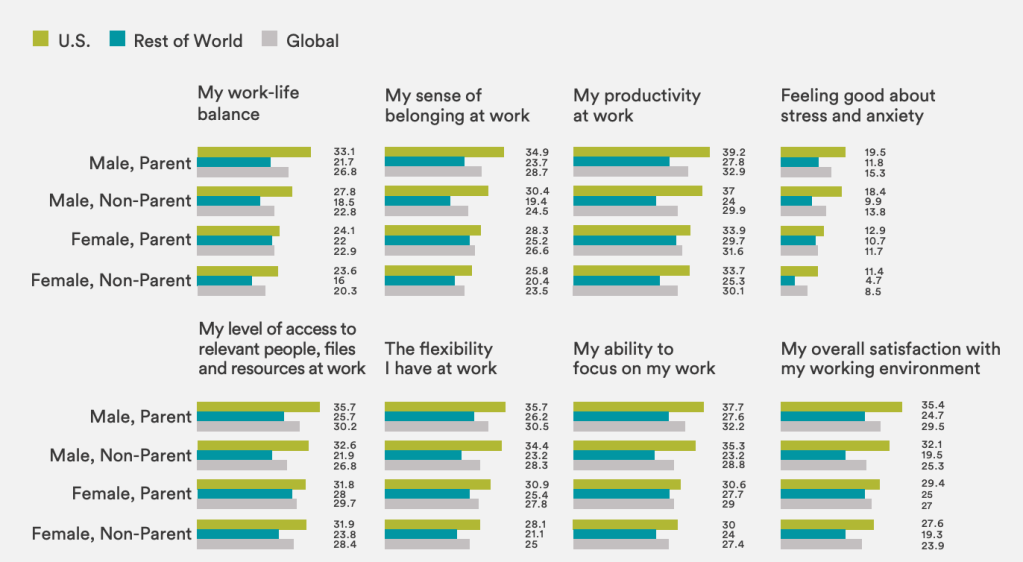
Winning the war for talent in the post-pandemic world
Future Forum study of 10,000 knowledge workers shows that 93% want flexibility in when and how they work; more than half are open to a job change
Posted June 15, 2021 by the Future Forum team
The way companies, teams and individuals work has changed more in the past 15 months than at any period of history. For leaders, the end of the pandemic is when the real work begins and a tough question must be answered: What’s the plan forward?
With our latest research, playbooks and white paper, Future Forum aims to provide leaders with data, insights and practical solutions as they navigate this massive shift. The most recent set of data—based on research from more than 10,000 knowledge workers in the U.S., the U.K., France, Germany, Japan and Australia conducted by Qualtrics—provides a snapshot of how employee expectations have changed.
The Future Forum Pulse shows that flexibility now ranks second only to compensation in determining job satisfaction: 93% of knowledge workers want a flexible schedule, while 76% want flexibility in where they work.
And employers should take note: One in five (21%) knowledge workers is likely to jump to a new company in the next year, and more than half (56%) are open to looking for a new position.
Here are three key insights from the Future Forum Pulse:
1. Flexible working hours are more important than flexible locations
Flexible work, in all its forms, has become a default expectation for knowledge workers.
Location flexibility has a significant impact on knowledge workers’ ability to manage stress (58% higher for those working fully remote), their work-life balance (45% higher) and their overall satisfaction at work (30% higher).
But schedule flexibility has an even more dramatic impact: Employees are more productive and significantly less stressed—and they even report being better connected to the people and information they need to get the job done (see below chart for detailed numbers).
Future Forum Pulse scores for schedule flexibility
But flexibility has its limits. Knowledge workers still want some structure in their workday. Two-thirds (65.6%) want a balance between full flexibility and a predictable framework. Typically, this consists of a limited set of core team hours (e.g., 10 a.m.–2 p.m.) for meetings and quick responses, while allowing for individual flexibility the rest of the day.
2. The office has a role to play, but digital infrastructure is the big differentiator
In the pre-pandemic era, leading-edge companies spent vast sums on offices in prime locations and campuses with elaborate perks. In the post-pandemic era, that same investment should be rerouted to digital infrastructure.
Fewer than 20% say they see the office as a place for focused, solo work. Instead, more than 80% of knowledge workers say they want access to an office for in-person collaboration and team building—activities like collaborating with coworkers and clients (33%), attending in-person meetings (20%) and building camaraderie (25%).
If offices are primarily for in-person collaboration and team building, then digital channels are where work happens. Companies that make the required investments in new digital infrastructure see dramatic improvements, compared to those relying on legacy systems. This shows up not only in expected areas such as productivity (+54%) but also in the sense of belonging (over 2x) and ability to manage stress and anxiety (over 5x).
Future Forum Pulse scores by company’s approach to adopting new technology
The Future Forum Pulse also shows that the frequency of communication within teams has a major impact on employee satisfaction. Knowledge workers who use digital infrastructure to communicate multiple times per day score significantly better than those who rarely communicate: They have nearly 3x the sense of belonging and over 2x the ability to manage stress and anxiety.
3. Flexible work is a game changer for working mothers and Black knowledge workers
In the U.S., working mothers have carried a disproportionate burden through the pandemic, with half a million more women leaving the labor force than men. Even though women were working from home, the pandemic put a spotlight on the rigidity of work schedules, which led to unprecedented burnout and attrition. The Future Forum Pulse shows this in stark detail: Women with kids score lower than men with kids across each element of the research, including work-life balance (-38%), ability to manage stress (-50%) and sense of belonging (-23%).
Future Forum Pulse scores by parental status and gender

Flexible working models are a potential game changer. Women with kids say that the number one benefit of a flexible schedule is “being better able to take care of personal or family obligations during the day” (men with kids rate “better work-life balance” as the key benefit). Normalizing and encouraging flexibility for all employees is one of the keys to reversing these numbers.
Black knowledge workers also have lower satisfaction scores across the board. They have consistently lower satisfaction with their relationships at work, are less likely to believe that they are treated fairly at work and are more likely to believe they need to justify their work to their manager. Not surprisingly, Black employees are even more likely to be looking for new opportunities in the coming year: 72% of Black employees versus 51% of white employees.
Flexible work opens the door to reversing these trends. Black knowledge workers are more likely to say that working remotely is better for their sense of belonging than to say it’s worse, while the opposite is true for white knowledge workers. Sixty-eight percent of Black knowledge workers want flexible work policies, compared to 56% of their white counterparts.
For companies seeking to improve diversity, geographic distribution matters: About 60% of the Black labor force is located in the U.S. South, compared with only one-third of private-sector jobs. Building diverse and inclusive teams is possible only when companies embrace the real flexibility that creates equitable access to opportunity.
Winning the war for talent requires leaders to ask three big questions:
The specific answers will look different for each industry and each company. Winning the war for talent depends on accepting that there is no going back to the pre-pandemic world of work. Attracting and retaining the best talent depends on moving forward.

